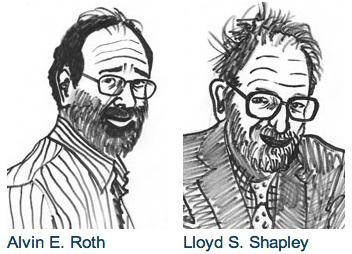The economics Nobel-ish prize has been awarded to American game theorists Alvin Roth and Lloyd Shapley. The common thread in their work has to do with matching in markets where swapping and the use of money are constrained or forbidden. Shapley modeled this somewhat whimsically with a very stylized notion of a marriage market, and showed that the optimal outcome is one in which women use a strategy of “deferred acceptance.” That is to say that instead of saying yes to the suitor she likes the best, the recipient of multiple proposals should reject the suitors she doesn’t like the best and just pocket the best offer. Then the rejects make a secondary offer, so now women who pocketed a proposal in the first round can swap if they got a better match in the second round. The procedure repeats and you can show that the resulting arrangement meets certain formal criteria for stability.
You can also show that the convention (in this case) that men propose rather than women makes a difference. If you use the same procedure but flip the genders, you also get a stable outcome but it’s one in which the women on average get a better this.
This is obviously not how people actually get married, but later elaborations of the work have shown it to have a lot of practical applications. The clearinghouse for assigning medical students to residencies works along these lines, as Roth has shown, and he was later brought in to help redesign the system to better suit the needs of medical students who were also romantic partners. Roth’s work in this field has also shaped the design of public school choice programs in Boston and New York where, again, the idea is to match students with schools without selling slots to the highest bidder.
These concerns are a bit far afield from the debates you normally see in the economics blogosphere, which I think is a good thing. An awful lot of economics is extremely politicized and features relatively little in the way of really persuasive work. Shapley, Roth, and deferred acceptance is a good example of the whole range of economics work that isn’t like that. These ideas are relevant to policy, but far from the core of ideological disagreement in American politics and the application of smart mathematical analysis to the problems has actually yielded better solutions rather than just better talking points.
